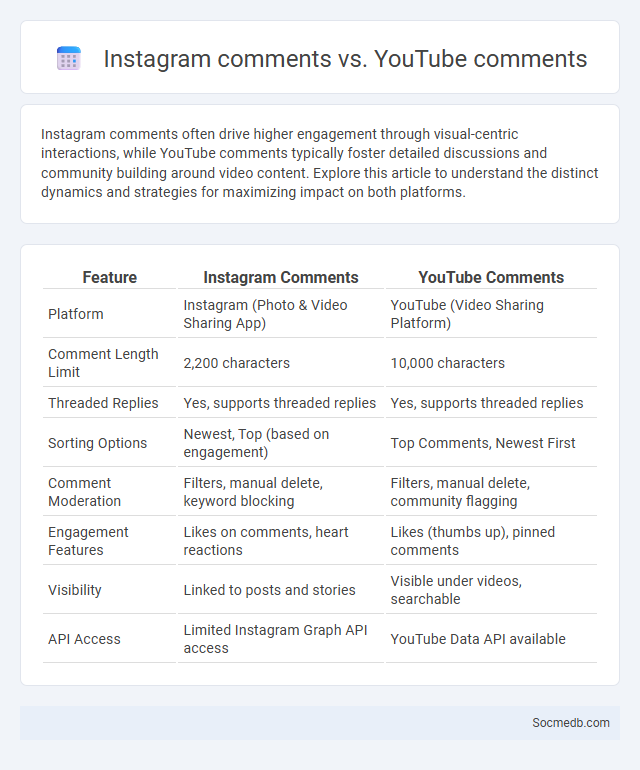
Photo illustration: Instagram Comments vs YouTube Comments
Instagram comments often drive higher engagement through visual-centric interactions, while YouTube comments typically foster detailed discussions and community building around video content. Explore this article to understand the distinct dynamics and strategies for maximizing impact on both platforms.
Table of Comparison
| Feature | Instagram Comments | YouTube Comments |
|---|---|---|
| Platform | Instagram (Photo & Video Sharing App) | YouTube (Video Sharing Platform) |
| Comment Length Limit | 2,200 characters | 10,000 characters |
| Threaded Replies | Yes, supports threaded replies | Yes, supports threaded replies |
| Sorting Options | Newest, Top (based on engagement) | Top Comments, Newest First |
| Comment Moderation | Filters, manual delete, keyword blocking | Filters, manual delete, community flagging |
| Engagement Features | Likes on comments, heart reactions | Likes (thumbs up), pinned comments |
| Visibility | Linked to posts and stories | Visible under videos, searchable |
| API Access | Limited Instagram Graph API access | YouTube Data API available |
Introduction to Instagram Comments, YouTube Comments, and General Comments
Instagram comments enable users to engage directly with posts through text, emojis, and hashtags, fostering interactive communication. YouTube comments provide a platform for viewers to discuss content, share feedback, and build community around videos and channels. General comments across social media serve as a vital tool for audience interaction, allowing users to express opinions, ask questions, and influence content visibility through engagement metrics.
User Interaction: How Engagement Differs Across Platforms
User interaction varies significantly across social media platforms, with Instagram prioritizing visual content engagement through likes and comments, while Twitter emphasizes real-time conversations via retweets and replies. Facebook fosters community building and detailed discussions within groups, enhancing meaningful exchanges among users. Understanding these platform-specific engagement patterns helps you tailor your content strategy for maximum user interaction and reach.
Comment Moderation and Filtering: Comparing Tools and Effectiveness
Effective comment moderation and filtering tools are crucial for maintaining a positive social media environment by automatically detecting and removing spam, offensive language, and harmful content. Platforms like Hootsuite, Sprout Social, and Brandwatch offer advanced AI-driven filtering capabilities that analyze sentiment, flag inappropriate comments, and allow customizable keyword filters to suit Your community guidelines. Choosing the right tool depends on factors such as integration options, real-time moderation features, and the ability to handle multilingual content for global audience engagement.
Content Quality and Depth in Instagram vs YouTube vs General Comments
Instagram emphasizes visually striking and concise content that captures attention quickly, while YouTube prioritizes in-depth video content with comprehensive explanations and storytelling, allowing creators to explore topics in greater detail. General social media comments often lack depth, focusing more on brief reactions or feedback rather than substantial discussion, impacting overall engagement quality. For your content strategy, balancing Instagram's immediacy with YouTube's depth can maximize audience reach and retention.
Community Culture: Vibes and Trends Across Comment Sections
Social media comment sections serve as dynamic hubs for community culture, reflecting the collective vibes and emerging trends unique to each platform and audience. These interactions shape online discourse, fostering shared language, memes, and values that influence user engagement and content creation. Understanding the nuanced sentiment and behavioral patterns in comments provides valuable insights into the evolving digital culture and social dynamics.
Algorithms and Comment Visibility: Instagram vs YouTube vs Others
Instagram's algorithm prioritizes content with high engagement, meaning comments significantly boost your post's visibility by signaling relevance and interaction to the platform. YouTube favors videos with sustained viewer retention and meaningful comments, where longer and thoughtful discussions increase a video's ranking in search and recommendation feeds. Other platforms like Facebook and TikTok use a mix of engagement signals and user behavior data to determine comment visibility, but your active participation in comments consistently enhances your presence across all social media channels.
Spam, Bots, and Trolls: Managing Negative Interactions
Spam messages overwhelm social media platforms by flooding feeds with irrelevant or malicious content, degrading user experience and platform integrity. Bots automate interactions, often amplifying misinformation or manipulating trends, which complicates content moderation and trustworthiness. Trolls provoke and disrupt conversations intentionally, necessitating robust filtering tools and community guidelines to maintain healthy online environments.
Influencer and Creator Responses: Engagement Strategies on Each Platform
Influencers and creators tailor their engagement strategies to fit the unique algorithms and audience behaviors of each social media platform, leveraging Instagram's visual-centric features, TikTok's short-form video trends, and YouTube's long-form content capabilities. Utilizing analytics tools, they optimize their posting times, content formats, and interaction methods such as polls, live streams, and comment replies to maximize reach and follower interaction. Cross-platform collaboration and personalized communication foster stronger community bonds, enhancing brand partnerships and audience loyalty.
Monetization and Brand Interaction Through Comments
Social media platforms enable monetization by allowing brands to capitalize on user-generated content and interactive comments to boost engagement and increase sales. Brands leverage comments for real-time feedback, customer service, and targeted advertising, enhancing customer loyalty and driving conversion rates. Effective management of comment sections fosters community growth, amplifies brand messaging, and unlocks new revenue streams through influencer collaborations and sponsored content.
Future Trends: Evolving Comment Features Across Social Platforms
Social media platforms are rapidly advancing comment features to enhance engagement and user interaction, integrating AI-driven moderation and threaded conversations for clearer communication. Voice and video comments are becoming more prevalent, offering richer, more expressive ways for users to connect. Your experience will be shaped by these innovations, making online discussions more dynamic and accessible across diverse platforms.
 socmedb.com
socmedb.com